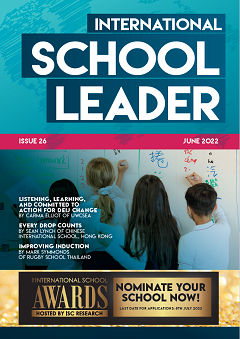By Francesco Banchini
At this year’s International School Awards, the European Azerbaijan School received a special commendation for delivering educational support to students who are living in the Nagorno Karabakh war zone. CEO and Director, Francesco Banchini, shares the school’s story.
During the past few years, we have learnt new skills and adapted like never before – all within a short period of time. There has been a dramatic shift in the direction and purpose of our lives. We are still in the transitional phase where the past is known but our day-to-day lives continue to contain an unprecedented level of uncertainty. I would like to share some personal reflections on this recent period of disruption and opportunity.
A shift towards distance learning
There are several opportunities that have been created over the past few years, such as a move to distance learning. This increased our skills enormously and gave us the motivation to rethink how we relate to our students. As we moved from a familiar learning path, albeit one where a vision of moving forward and keeping the community safe was our motivational drive, we approached distance learning as a new horizon and unknown territory. At our school, it has been an opportunity to develop our skills and engage our students in an enhanced digital educational era. We have been able to introduce a range of different platforms to engage our learners, although significant investment in training was needed to ensure that teachers felt confident to embrace the new technology.
While embracing this new pathway, heavily dependent on electronic devices, we realised that this approach to learning meant that learning developed differently, and students needed greater skills of self-organisation and motivation. At the same time, the mandated lockdown resulted in high levels of anxiety. These two factors were counterproductive. We were asking more of our students, teachers and families at a time when they were experiencing high anxiety.
Fostering comfort in the community
As a leader, it was imperative to create comfort within our community and as the challenge of distance learning continued, we developed support systems across our two campuses. We held meetings with students, parents and teachers to discuss the issues and challenges they were facing. This was vital in establishing effective communication with our stakeholders.
At the same time, the IB took the decision to delay deadlines to submit documentation and later decided to cancel the M20 examinations. Whilst we welcomed the IB’s desire to show compassion and fairness, we had to address our parents’ and students’ queries about how the overall grades would be calculated. Even though it was stressful time for our community, our stakeholders found comfort when the IB were responsive to revising grades after receiving feedback from the community.
Summer in Azerbaijan went by in strict lockdown, and we held online meetings with parents to reassure them that we were investing time in fulfilling the necessary procedures needed to establish a safe return when we were allowed to do so. Infection rates were moderately low and in the second week of September, we welcomed the news that the government allowed us to resume school. We rehearsed the opening and through this, we all became confident in maintaining safety. With on-site learning resuming, it felt as if things were returning to a state of normality.
Addressing the challenges ahead
On the evening of 27th September 2020, the war in the Nagorno Karabakh region began and the tenuous feelings of normality were shaken as the situation became more uncertain. We resumed school on site but at the same time, some of our community members were called to go to the front. The news and images received created an uncomfortable atmosphere in our community. As an IB school, we focus on promoting international mindedness and encourage diversity. However, this war created many challenges for us, and we decided to close our doors again.
The war ended 45 days later and there was relief in all of Azerbaijan. Unfortunately, many families were mourning the loss of their loved ones and it was natural for us to respond to those in need by organising a trip to support families in two villages: Barda and Agdam. Every member of our community wanted to be involved and we provided them (and still provide them) with ongoing care.
Even before the war ended, I was reflecting on the fact that our community needed to regain its sense of purpose by looking outwards rather than inwards. We developed the idea of providing educational support to students who were living in the war zone. We are in such a privileged position in our learning community compared to these students. As educators, we have the moral duty to make a difference by sharing knowledge and developing educational strategies which benefit everyone. A meeting with colleagues asked them for their feedback and availability, as they would all have to provide their time and support voluntarily. There was an overwhelmingly positive response, and more than half of the teachers volunteered without hesitation. We contacted the Ministry of Education and discussed the plan to create and develop a dialogue with local schools and municipalities that could provide educational help for students and professional development for teachers.
The project was approved and, since December, we have been providing online lessons to Barda and Agdam schools, helping 350 students and providing professional development to 57 teachers. This is all happening at the same time as normal lessons on our two campuses.
Throughout the project lessons, we provide students with the experience of attending classes in an international school. By developing multidisciplinary approaches, with subject-integrated problem-based-reality lessons and hands-on learning, we gave them a different learning experience. We provided pedagogical support and professional development to the teachers based on the most recent educational practices. Our sessions were focused on developing student-centred approaches, inquiry-based and skills acquisition learning in an authentic context.
Our role as an IB school
As I reflect on these past two years, I wish to share a few key learnings about managing uncertainty:
- We have a high sense of resilience (students, parents and teachers), but this must be supported by concrete resource provision.
- It is vital to positively recognise the need for comfort during uncertain times and, as a leader, to provide it as a priority. Communication is an essential tool towards this end.
- Outward-looking projects, which enable a feeling of giving and purpose, can have a tremendous effect on motivation and morale. During the current war in the Ukraine, schools may wish to reflect on how they can turn their focus on projects which help those who are affected to help in a concrete manner. In our experience this helped the members of our learning community to manage their feelings.
This is a journey, and one which is certainly not smooth; however, it is one that I feel proud and motivated to be sharing with those inspirational individuals around me.
Our community needed to regain its sense of purpose by looking outwards rather than inwards.

Francesco Banchini is CEO and Director of European Azerbaijan School in Baku, Azerbaijan. Connect with Francesco on LinkedIn.


